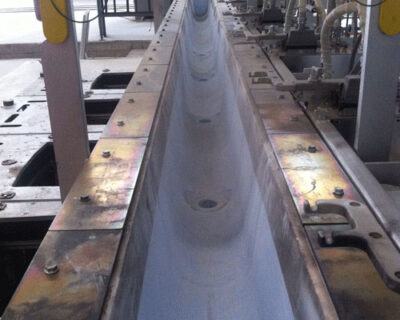Aluminum Casting and its impact in sustainable manufacturing
Wiki Article
Finest Practices for Maintenance and Applications in the Aluminum Shop Industry: A Comprehensive Review
Maintaining devices in the aluminum factory field is crucial for functional success. Regular inspections and predictive maintenance can significantly decrease downtime and improve safety. Advanced technologies, such as IoT and data analytics, play a pivotal role in this process. Nonetheless, understanding the full range of ideal techniques calls for a better assessment of details strategies and their effect on efficiency. What are the necessary components that add to a trustworthy upkeep structure?Relevance of Routine Upkeep in Aluminum Foundries
Regular maintenance plays a crucial function in the efficient procedure of aluminum shops. By systematically servicing and evaluating tools, shops ensure peak efficiency and long life of machinery. Routine upkeep activities, such as lubrication, cleansing, and part replacement, assistance protect against unexpected breakdowns that can bring about pricey downtime.Moreover, routine checks boost work environment security by recognizing prospective dangers before they intensify into severe concerns. Equipment that is properly maintained operates much more effectively, bring about improved product top quality and reduced waste. In addition, adherence to an organized maintenance schedule can sustain compliance with industry laws, therefore cultivating an online reputation for integrity and top quality within the market.
Carrying Out Predictive Maintenance Techniques
Anticipating maintenance strategies take the principles of routine upkeep an action additionally by leveraging data analytics and progressed tracking modern technologies. In aluminum foundries, these techniques make it possible for drivers to expect equipment failings before they occur, consequently decreasing unintended downtimes and enhancing functional performance. By utilizing sensing units and IoT devices, real-time data can be collected on machine performance, permitting the identification of potential problems through predictive analytics.Enhancing Melting and Pouring Processes
Effective melting and putting processes are essential for making the most of efficiency and ensuring the quality of light weight aluminum spreadings. To boost these processes, shops need to concentrate on precise temperature control throughout melting, as this straight affects the metallurgical properties of the alloy. Using innovative melting technologies, such as induction and resistance melting, can enhance power performance and minimize cycle times.Implementing automated putting systems decreases human mistake and keeps consistency in the pouring procedure. Appropriate mold preparation, including adequate preheating, is important to protect against thermal shock and improve mold durability.

Enhancing Safety And Security Methods in Factory Workflow
Focusing on safety and security in light weight aluminum shop operations is crucial for protecting workers and guaranteeing a productive setting. Effective safety and security methods consist of routine training sessions that emphasize the relevance of individual protective devices (PPE), such as gloves, helmets, and goggles. In addition, the establishment of clear emergency treatments is important in taking care of potential accidents.Routine examinations of devices and equipment aid identify hazards before they rise right into major problems. Implementing a durable coverage system motivates workers to interact safety concerns without fear of effect. Promoting a society of safety assurances that every worker recognizes their function in preserving a safe and secure workplace.
Additionally, guaranteeing appropriate ventilation and tracking air high quality can reduce exposure to damaging fumes and dirt. By enhancing these techniques, aluminum factories can considerably decrease the threat of accidents and develop an environment where staff members really feel valued and risk-free, eventually improving overall operational performance.
Leveraging Modern Technology for Improved Performance
Making use of advanced innovation has come to be significantly crucial for light weight aluminum factories intending to enhance functional effectiveness. Automation and robotics play aluminum casting company an important role in improving production procedures, decreasing labor costs, and minimizing human mistake. Carrying out real-time monitoring systems allows for the continual evaluation of equipment efficiency, allowing proactive upkeep and minimizing downtime.
Moreover, the assimilation of information analytics gives valuable understandings into functional process, assisting in better decision-making and source appropriation. Anticipating analytics can determine possible failings prior to they occur, additional enhancing maintenance schedules.
In addition, taking on innovative melting and spreading technologies enhances energy efficiency and product return, which are essential for sustainability in the market. By welcoming these technological improvements, light weight aluminum factories can not just improve productivity yet likewise maintain an affordable side in a significantly requiring market (aluminum foundry). Inevitably, leveraging innovation is critical in driving innovation and enhancing overall operational performance within the industry

Regularly Asked Questions
What Prevail Indicators of Equipment Wear in Light Weight Aluminum Foundries?
Common indications of equipment wear in light weight aluminum shops consist of unusual noises, decreased performance, boosted vibration, overheating parts, leaks, and visible deterioration. These signs often signify the requirement for upkeep or possible replacement to stay clear of costly downtime.How Can I Train Personnel for Effective Upkeep Practices?
To train personnel for efficient upkeep practices, one can carry out hands-on workshops, develop comprehensive guidebooks, motivate mentorship programs, and carry out regular evaluations to assess abilities and knowledge, ensuring all workers recognize maintenance methods thoroughly.What Are the Environmental Regulations for Light Weight Aluminum Foundries?
Light weight aluminum shops are subject to different environmental regulations, consisting of exhausts control, waste monitoring, and resource conservation. Conformity warranties very little environmental influence, advertising sustainability while adhering to regional, nationwide, and international environmental requirements and policies.Just How Do Foundries Take Care Of Waste and Recycling of Aluminum?
Foundries manage waste and recycling by executing systems for collecting scrap light weight aluminum, utilizing innovative splitting up innovations, and working together with reusing facilities to guarantee effective recuperation procedures, consequently reducing ecological influence and advertising sustainability within the industry.What Are the Prices Connected With Applying Advanced Technologies?
Implementing advanced technologies in shops incurs significant expenses, consisting of initial financial investment, training, and upkeep expenses. The lasting advantages, such as increased performance and decreased waste, typically validate these expenditures, leading to improved earnings. (aluminum foundry)
Report this wiki page